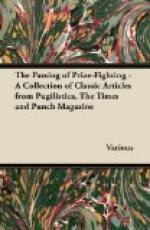But—stop—the tremendous row (a quarrel quite representative of Whitechapel in Italy, and suggesting to some of us what Signor Coster CHEVALIER might do if this Opera were Londonised) between Turiddu-de-Lucia and Santuzza-Calve is over, the latter has denounced her former lover, there is thunder in the air—the atmosphere is heavy with fate—and the stage is clear. Then comes the intermezzo, foreboding ill, presaging tragedy,—magnificent! And as MANCINELLI bows from his seat, acknowledges the thunder of applause—this was the thunder in the atmosphere—and pulls his forces together again to repeat and emphasize the triumph—DRURIOLANUS shuts up his lorgnette, beams on the world around, and murmurs to himself, “Waterloo is won!” Decides thereupon to give the same performance on Thursday, and does so, with repetition of triumph.
Now one word as to a picturesque detail. The action takes place on Easter Sunday, not on Palm Sunday; but Archbishop DRURIOLANUS has issued a pastoral melody dispensing his flock from the usual custom, and allowing them to have the palms distributed on Easter Sunday, for the sake of the show. “Palmam qui meruit ferat,”—and well does each one of the Chorus deserve his or her palm. And do not those in front who are nervous as to splitting their glove-seams, also bare their palms to applaud this Opera? Why certainly. Truly, Sir DRURIOLANUS ARCHIEPISCOPUS DISPENSATOR, well hast thou inaugurated the palmy days of this Opera Season.
Friday.—Faust selected because alliteration in Faust and Friday. A trifle, but as DRURIOLANUS says, “The world is governed by trifles.” Wise saw this, with practical modern instance. VAN DYCK looking like a Rembrandt, a Faust-rate Faust, and Miss EMMA EAMES a charming Marguerite, Mons. PLANCON’s Mephistopheles a la Francaise. Mons. CESTE good as Valentine. A propos of Valentine and his soldiers, why do the army and their friends who come to welcome them, invariably turn their backs on the triumphal procession, taking no sort of interest in it whatever? Also, why is that banner persistently and purposelessly waved during the whole of the great Soldiers’ Chorus? Is this the reason why nowadays the ever-popular Soldiers’ Chorus is seldom encored? As this monotonous action on the part of the Bannerman (not CAMPBELL of that ilk, but the ensign-bearing supernumerary) suggests “flagging interest,” hadn’t it better be abolished altogether?
Saturday.—Great excitement in outer Hall. Everybody buzzing about. What has happened? Has dynamite been found? Has some eminent vocalist “gone up to see,” and can’t come down again in time? Sir DRURIOLANUS is present, explaining matters to the critics, and repeating explanation in various tongues to eager foreign inquirers. The sentinels eye the moving scene with determination and bayonets fixed. At a word from Sir DRURIOLANUS, they will give an extra charge, and rout the crowd. “What is it all about?” asks little PETERKIN. Sir DRURIOLANUS can tell him. Madame CALVE is indisposed, and L’Amico Fritz cannot be performed. So GLUCK’s Orfeo is substituted in a happy-g’lucky sort of way. The two RAVOGLI are excellent, and Box and Stall are satisfied.




